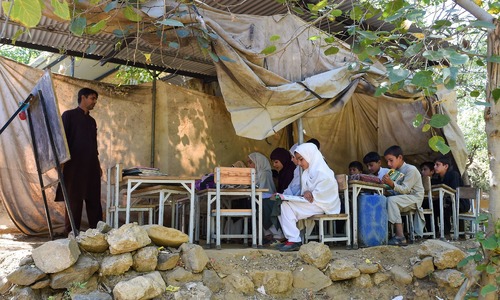IT’S not often that I see eye to eye with our chief justice on matters relating to judicial activism. But when he raises the issue of overpopulation, I am happy to support him.
If I were to focus on a single issue that has directly caused many of Pakistan’s woes, it would be the sheer number of people now jostling for space and resources. Consider: at Partition seven decades ago, West Pakistan (and now just Pakistan) had a population of around 32 million. This number has now shot up to 220m.
Pakistan’s looming crises: Increasing population, dwindling resources
Even far richer countries would struggle to cope with such a rapid increase. Had Pakistan a better track record of governance, we still would not have been able to feed, clothe, house and educate these teeming millions. As it is, ineffective politicians and generals have not given the matter much thought or resources.
Explore: Climate woes & population
Ayub Khan was the last leader to take population seriously, and to fund a family planning programme. After him, leaders tended to push the problem on the back-burner, expecting their successors to tackle this potentially sensitive subject. But despite the resistance from the clerical community, the fact is that the Muslim belief system is silent on the subject of birth control.
Successive governments have skirted around the whole issue.
As a result of the lack of political will, successive governments have skirted around the whole issue. There was a time when the media discussed overpopulation; seminars on the subject were organised; and NGOs worked to motivate couples to have fewer babies. Now, in an era of multiple media channels, all we hear is silence.
According to a report published in this newspaper, Pakistan needs to create around 2m jobs to absorb the young people who enter the market every year. Currently, 4m youths aged between 15 and 24 years are unemployed; by 2020, this number is expected to rise to 8.6m.
What happens to this huge pool of the unemployed? For most parents, getting a job for their son is an acute and pressing problem. This is why Imran Khan’s campaign pledge of creating 10m jobs in five years resonated with so many voters.
Take a look: Population and security
Many jobless youths turn to crime; others to drugs; and some take the jihadist route. The reality is that our economy simply does not create the number of jobs needed to absorb the millions of young people applying for them. A lack of fresh investment, combined with a slowdown in government recruitment, has closed the doors to formal employment.
The 1951 census showed East Pakistan to have a population of 66m, while the western wing was home to 42m. Currently, Bangladesh has a population of 163m with a growth rate of 1.04 per cent, while Pakistan’s numbers have shot up to close to 220m with a growth rate of 2.1pc. Older readers might recall that when Bangladesh came into being, Henry Kissinger dismissed it as “an international basket case”, while many in Pakistan sneered at the rate at which Bengalis were supposed to reproduce.
Actually, the reverse has occurred, with Pakistanis breeding like rabbits due largely to our male-dominated society in which women have little say or control over the number of babies they have. Most Pakistani children are undernourished and uneducated, hardly the ‘assets’ politicians like to claim they are. Our exploding numbers are, if anything, a time bomb that is destabilising society.
Against this backdrop, the chief justice’s suggestion to give population planning priority is to be welcomed, even though I doubt if much will come of it. Given the political power numerically insignificant religious parties have acquired, it is doubtful that a politician like Imran Khan, sympathetic as he is to the religious right, will go against the flow, and actually push through a programme to limit population growth rate.
The reality is that politicians tend to think in the short term, and refuse to face down the most backward elements in our society. Clerics have often attacked efforts to control population as a Western plot to reduce the number of the faithful. Ask them how children will be educated, fed and housed, and you get an answer that shuts down the discussion: “The Almighty will provide.”
Unless politicians find the political will and the courage to change this discourse and push the narrative into the 21st century, Pakistan is poised to become the fourth most populated country in the world with 306m people. Luckily, I won’t be around then to witness this mass of humanity squeezed into a relatively small area, but I shudder to think of what my grandsons will have to go through.
While there is no silver bullet to solve the problem, countries like Bangladesh have proved that by educating and empowering women, a slowdown in the growth rate is entirely feasible. Other Asian countries have had the same experience. But Pakistan, with its criminal neglect of education, has failed its children in so many ways.
Published in Dawn, December 15th, 2018














































